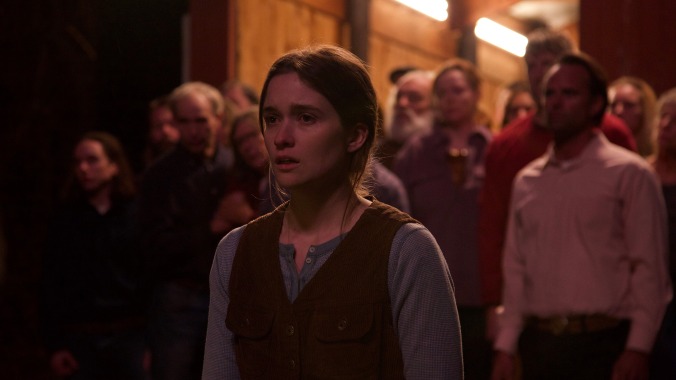Deeply isolated and too poor for anyone from outside to take much of an interest, the rolling hills of Appalachia provide the perfect haven for outcasts. Shaded by acres of woods atop one of the region’s many mountains, you can live—and worship—in near-perfect privacy, a state of being that appeals to fringe religious groups as well as whiskey runners and pot farmers. The most notorious of these mountain churches are the self-proclaimed “Holy Ghost People,” a particularly fervent Pentecostal sub-sect that rejects modern medicine and believes in salvation through the handling of serpents. In plain terms, that means that they believe that when you sin, you should go to church and let a poisonous snake slither all over your body to prove your devotion. If you emerge unscathed, that means God forgives you. If you get bit? Well, that’s God’s will, too. Sorry, no antivenom allowed.
Snake handling is controversial, even among Pentecostals. It’s also dubiously legal. Combined with the exotic visual of people dancing around with live rattlesnakes, that makes snake handling a sexy prospect for writers looking to add a little local color to their screenplays. The latest film to take the bait is Them That Follow, the debut feature from co-writers and co-directors Britt Poulton and Dan Madison Savage. And although Poulton and Savage’s approach to the material is more anthropological than exploitative, the film nevertheless fails to go beyond the surface of this little-understood subculture.
Alice Englert stars as Mara, the dutiful daughter of snake-handling pastor Lemuel (Walton Goggins) who’s torn between her heart and her soul. On “the mountain,” Lemuel is not just a spiritual advisor. He’s also a matchmaker, a judge, a doctor—basically every earthly (and godly) authority figure wrapped into one. He mandates that female members of the church dress in modest, long-sleeved clothes, and disapproves of Mara driving the family truck. Yet, Mara’s inner conflict has nothing to do with her Christian faith, which remains strong throughout the film. No, her problems have a more earthbound source: She’s got a secret boyfriend, rebellious agnostic Augie (Thomas Mann), and just found out she’s pregnant with his child—obviously a no-no in this conservative community. Further complicating the situation are her father’s efforts to set her up with another local boy, Garret (Lewis Pullman), whose willingness to go to jail for Lemuel and the church makes him the perfect potential son-in-law in the pastor’s eyes.
The question of why and how a woman could remain loyal to such a strict patriarchal belief system is arguably more interesting than a love triangle between morose young people who don’t even seem to like each other that much. Yet Them That Follow treats the characters’ beliefs as a quotidian given, neglecting to explore the profound mysteries of faith so eloquently evoked in the recent Novitiate and First Reformed. Part of the problem lies in Englert’s stoic performance as Mara, which is too much secret and not enough turmoil. Next to the rest of the cast—which also includes Kaitlyn Dever as Lemuel’s perpetually cowed ward Dilly and Olivia Colman as Sister Slaughter, a community member whose ardent faith is rooted in deep regret—Englert’s Mara seems less tortured than simply tired, an underwritten character whose overall passivity makes a sudden third-act turn all the more inexplicable.
Perhaps that’s why, despite some skillful scene-setting and committed supporting performances, Them That Follow is lifeless enough that small inconsistencies in accents, costuming, and set dressing appear more significant than they would in a more, well, thrilling thriller. You don’t get the impression that Poulton and Savage are making fun of the characters, or parading them across the screen in a “look at these crazy hillbillies” type of freak show. But the film’s apparent disinterest in the characters’ faith also seems to suggest that Poulton and Savage don’t take them all that seriously, either. When you’re watching a scene where a family is being forced to choose between sawing their son’s arm off or allowing him to die of a gruesomely infected snake bite, and all you can think about is how one of them is wearing a wolf T-shirt, that should be the first sign that the holy spirit—or creative inspiration, or directorial vision, or whatever you want to call it—is occupied elsewhere.

